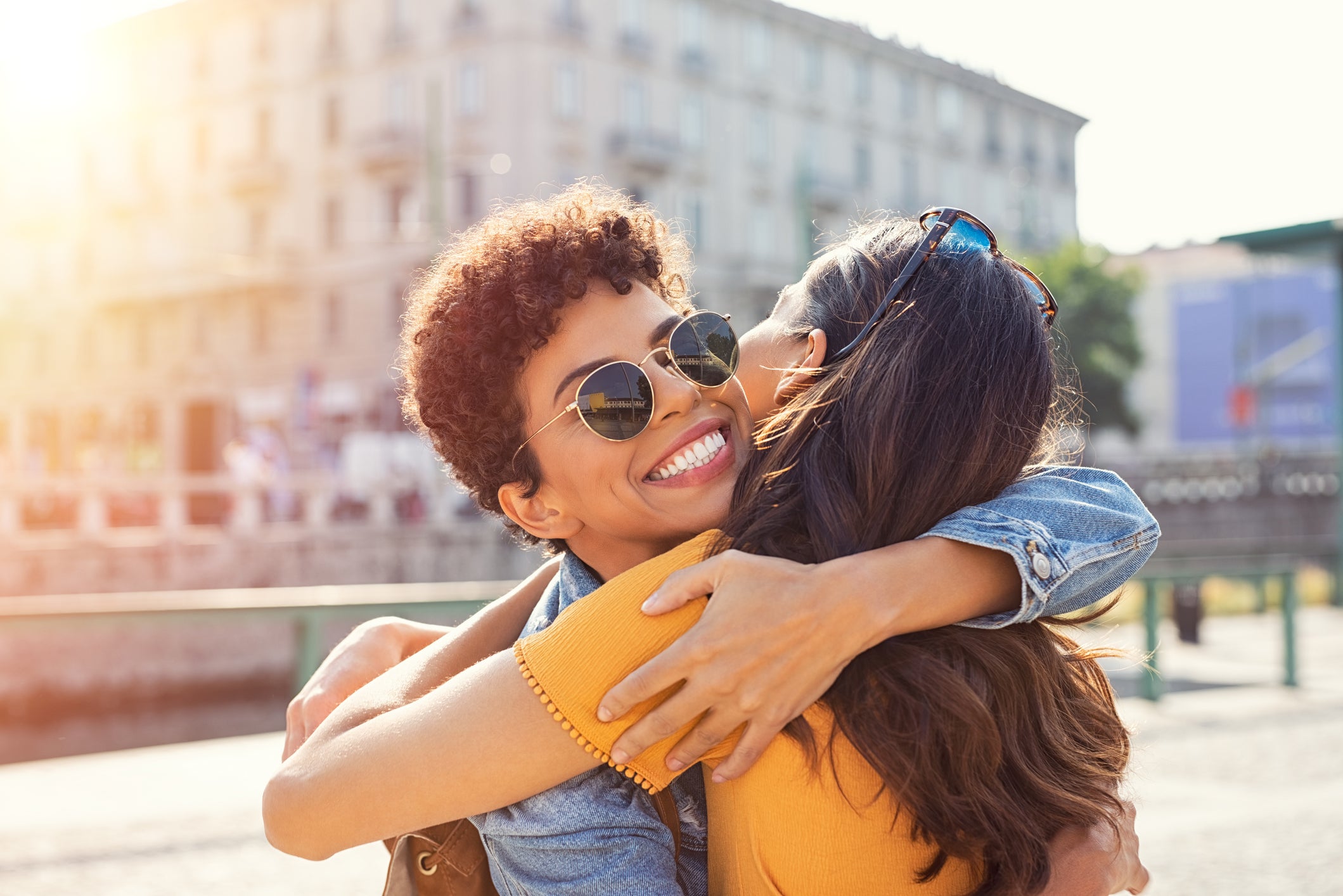Hugging might be back but not for me – Why I’ll still be social distancing after Covid
Just as the pandemic has highlighted our human need for physical interaction, it has also helped us re-evaluate the importance of physical boundaries, says Helen Wilson-Beevers


Last summer, I bumped into an acquaintance in the street. I flinched as she threw her arms around me. Having an autoimmune condition made me extra-cautious about Covid. I was annoyed this oblivious person overlooked my personal choice at a time many felt vulnerable to the virus.
But I also realised something else: I simply didn’t want to be hugged. After months of hugging being off the cards, I was surprised to find myself cringed out by the touchy-feely nature of her approach. For a few days afterwards it made me consider how many times I, too, may have invaded someone’s personal space with an unsolicited hug, so normalised had they become.
When the prime minister announced this week that we could once again hug our friends and family from Monday 17 May – a sentence unimaginable to our 2019 selves – it felt like one more step towards our post-Covid recovery. After over a year without touch, many of us have realised just how much we once took embracing loved ones for granted.
Obviously, I can’t wait to hug my best friends and parents once more. Breaking the awkward and unnatural distance we’ve enforced for so many months will feel jubilant. Touch is a vital part of communication and so often during the pandemic, this invisible barrier has created a block to intimacy. A touch on the arm to acknowledge someone’s joke, a squeeze of the hand to comfort a friend in need – physical contact can say so much more than words. Without it, relationships have been impacted and intimacy has been put on pause.
A specialist in relationships and communication, psychologist Dr Kalanit Ben-Ari explains that physical contact originates as an evolutionary survival instinct that begins at birth. “From the first moment a baby is born, they are dependent on and crave physical contact as a way to survive while seeking food, comfort and protection,” she says.
“There is evidence that a baby needs and prefers touch even more than food for healthy development.” This is because hugging activates the parasympathetic nervous system, Dr Kalanit explains. “So a baby in distress can be regulated and calmed by hugs and movement.”
With such personal origins, then, is it any wonder I find hugging an all-too intimate exercise between strangers?
Just as the pandemic has highlighted our human need for physical interaction, hasn’t it also helped us re-evaluate the importance of physical boundaries? With all the misery that Covid has caused, restrictions have also re-introduced us to the idea of personal space, from not hovering too close to someone on the bus, to respecting their boundaries and stepping aside as they pass you in the street.
You never know what physical barriers might be making someone hesitant to launch into your arms
Beyond personal preference, you never know what physical barriers might be making someone hesitant to launch into your arms. Once struggling with severe period pain at a family party, I stuffed a hot water bottle between clothing layers. When a fellow guest threw their arms around me, I was terrified of the potential unfolding embarrassment. Thinking my heat relief would either drop onto the floor, or I’d flinch in agony, instead I just seemed rude and standoffish in the awkward moment when I stepped back to avoid their incoming embrace.
Since becoming a mother, I’ve noticed the phenomenon of being taught to accept uninvited hugs is ingrained in us from our early years. Children are often instructed to hug friends or family members goodbye, with no regard for their own preferences. We’re teaching children from a young age that their desire for personal space doesn’t matter, instead of reenforcing in them the importance of regaining control over it – and consenting only when they feel comfortable. Instead of being made to cuddle Auntie Sue, a child should choose if they want to accept physical contact, so they can learn that they don’t have to please adults by relinquishing their consent.
Several media personalities masked more sinister unwanted touching with a touchy-feely, huggy exterior
It’s easy to see why we’ve become a nation of huggers. Through film and TV we’ve been fed the narrative of an unchallenged tactile culture, from Buddy the Elf giving out free hugs in the street, to Jessie squeezing a bashful Woody in Toy Story, and the characters in Friends hugging or touching each other all the time. But while cute in movies, if these scenarios played out in real life, they’d seem much more questionable. Now, we can think of several media personalities who masked more sinister unwanted physical contact with a seemingly harmless touchy-feely exterior.
Dr Kalanit outlines how we should be mindful of our own and other peoples’ preferences when it comes to physical contact after the pandemic. “Accept that we are different and try not to take it personally if others prefer not to hug. We all have a different pace. Acceptance of those differences and talking about how you feel about it with those close to you can help.”
I don’t want to return to a normal in which we barge past people, pushing them or tapping them on the shoulder, getting up close to them to squeeze past in a crowd. But, mostly, I emphatically don’t want to be hugged or air-kissed in greeting or for jumping into the arms of everyone I meet to be a universal expectation. So yes, bring on May 17, but I’ll be saying no to a hello hug and maintaining my social distance.
Join our commenting forum
Join thought-provoking conversations, follow other Independent readers and see their replies
Comments
Bookmark popover
Removed from bookmarks